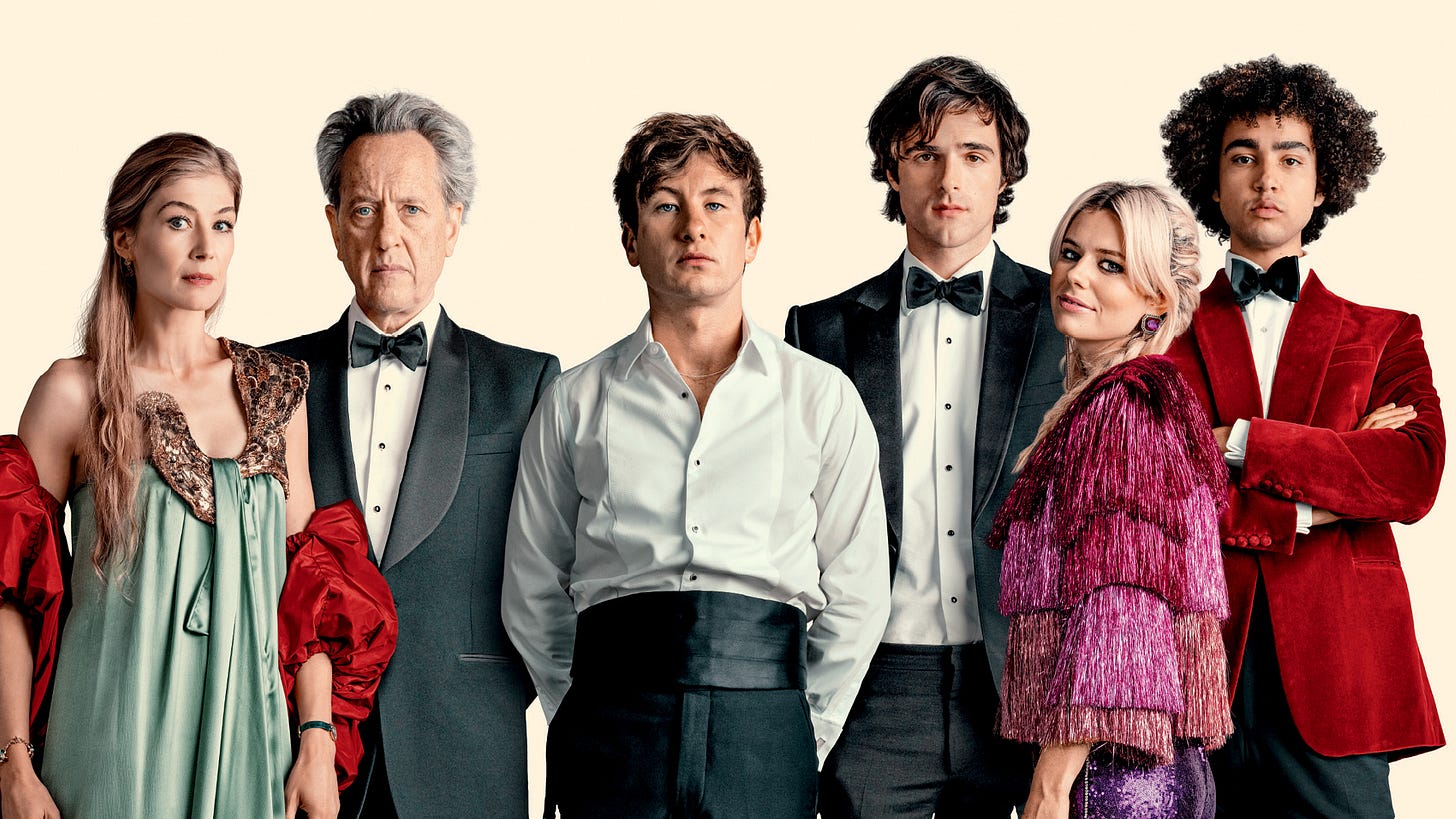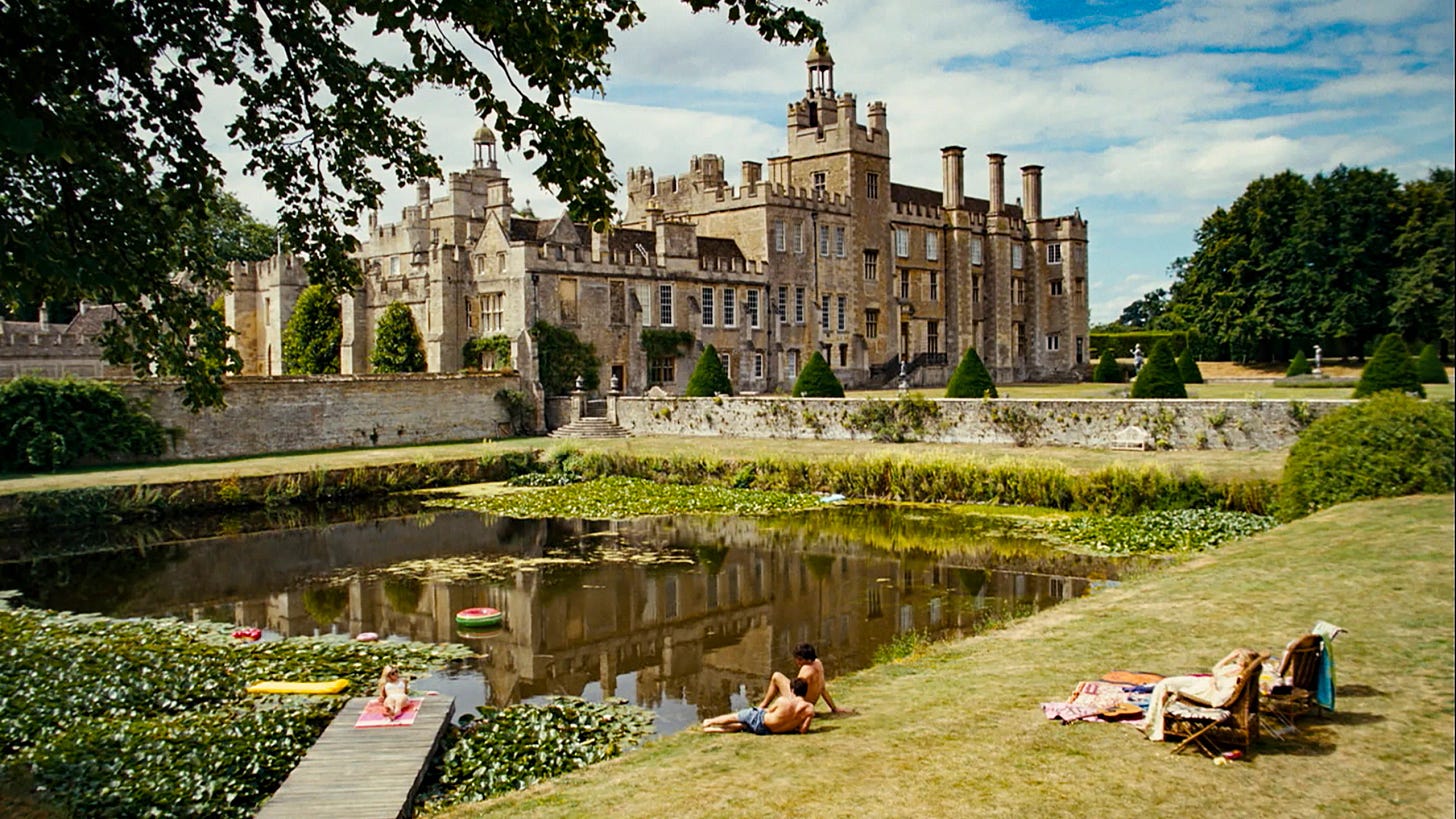Saltburn, Sex, and Cinematography: Aesthetic Hollowness in a Post-Euphoria World
Man is that title ridiculous
Hello again dear readers. Sorry for leaving for months, I was busy going to college (the horror!), or should I say film school (even worse!). I slowed down on the posting because I wondered if the world really needed to hear my cynical criticisms of, say, Trolls 3 or Taylor Swift. But a perfect storm has brewed: I’m on winter break, desperate for stimulation, and I just watched a very terrible movie. For one night only, I shall ride again on my very high horse.
I watched Saltburn yesterday, and as I poured out my steaming vitriol into a letterboxd review I thought to myself: there’s enough hatred here to write an article. So here we are, at the crossroads of Saltburn, sex, cinematography, and Euphoria.
To begin: I walked into Saltburn with trepidation. Emerald Fennell’s debut, Promising Young Woman, was riddled with plot holes and an alarming lack of ability to say anything substantial, so I was cautious about her second go around the block, especially because it seemed like Saltburn was attempting to tackle even more thematically. The premise is that the dorky Oliver Quick is drawn to the wealthy Felix Catton at Oxford, and invited to stay at his estate, Saltburn, over the summer. The promise is that this is an erotic thriller, teeming with class commentary and envelope-pushing depravity. But my God, did it fumble.
Saltburn is an embarrassingly transparent attempt to appeal to Gen Z, with its vapid “eat the rich” attitudes, tumblr-esque obsession with aesthetics, and reliance on some sloppy homoeroticism. Worst of all, there are a couple scenes thrown in there for the sheer purpose of generating shock factor buzz, which it actually succeeded at—I saw many a Tik Tok about people leaving the theater disturbed or elated, many alluding to “that” scene. I know this is nothing new—I’m sure if I was alive in the 50s I’d be angrily typing away about William Castle’s gimmick cinema—but it just alarms me that ‘shocking’ but useless scenes in films can be obvious marketing ploys and succeed in generating buzz. And I suspect this concerning trend is due to Euphoria.
Ah yes, Euphoria. The dead horse I will never tire of beating. Though the world has caught up to Sam Levinson’s bullshit and realized that Euphoria was kind of stupid, the echoes of the show reverberate through current media trends, excruciatingly evident in Saltburn. Both pieces are aimed at Gen Z, an audience aged from 14-20ish, and so aimed that it’s a hindrance.

Euphoria was shocking because it showcased male nudity, sex scenes, certain things that were not commonly accepted in teen television and therefore seen as pioneering. But it was always pointless, and inevitably failed to say anything substantial or interesting about the subjects it was so persistent on showing. In the end, it more or less glorified substance abuse and underage sex work, then called it a day. Saltburn has a similar approach—we get these scenes of Oliver’s so-called depravity that are meant to be shocking and disturbing… to 15 year olds. It’s a weirdly neutered cinema that’s clearly aimed at an audience young enough to believe that this is good content because it’s shocking content. But again, it’s meaningless. These scenes didn’t really establish Oliver’s depravity because the acts are (sorry guys) not that weird! And this depravity shows up so inconsistently that it does nothing to further any themes or plot, and ends up not really paying off at all. The scenes are just as impactful on their own than they are with the context of the film… which means that they serve absolutely no purpose but to shock. I’ve seen the bathtub scene compared to Elio’s peach scene in Call Me By Your Name, and I find it to be a really inaccurate comparison. Call Me By Your Name found popularity amongst youth, but it wasn’t designed to appeal only to Gen Z. And the peach scene was extremely poignant, a portrayal of obsession and lust that Elio found shameful. It’s rich with subtext and meaning, and often misinterpreted as this kind of carnival-sideshow-esque display of freakishness. Saltburn has these moments as if to say: hey, look at this freak being a freak! Without realizing that the reason it was so effective in Call Me By Your Name was because it had actual meaning, substance, and sympathy for its complex character.

Another Euphoria-ism I found in Saltburn was an overreliance on flashy cinematography that (surprise) is completely meaningless. The thing other than the shock value of Euphoria that made it popular was its distinct visual style: highly stylized, not going for realism but rather a surreal, dream-like quality. But the problem with that is that sometimes it just got a little full of itself, and the focus was singularly on “cool” or novel shots, not the actual… story… which ceased to really exist by the second season. Saltburn suffers the same failing: so much of the cinematography is solely focused on looking cool and becoming a Pinterest staple that it often fails to tell a compelling story, which is what cinematography is supposed to do!! When the cinematography of something like this or Euphoria is complimented, I kind of wince, because it’s this focus on aesthetic and beauty that disregards how cinematography can further a plot. So many moments were lost or not properly held because something kooky was happening with the shot, and only occasionally did shot choice provide a layer of meaning that wasn’t already extremely, overbearingly obvious. (I counted twice—in Oliver’s house and Oliver’s silhouette entering the maze). And the aspect ratio choice was a bad one: it just limited the ability of the shots without providing any feeling of claustrophobia/intensity. So it’s beautiful, sure, but completely devoid of meaning. Which I’ve heard a few people use as a defense of the film—that it’s supposed to be hollow/vapid/shallow to reflect the shallow nature of the uber rich… but I reject that. I really hesitate to ever say that a piece of media is shallow “on purpose” because I can’t really think of a case in which it successfully is. And it’s obvious that this film is trying very hard to say many things: it lacks any sort of self awareness that I think would lend itself to the form-as-function hollowness.
So let’s get into meaning. What is Saltburn saying—or at least, attempting to say? It definitely tries to be class commentary, but of course falls completely flat in doing so, never really having the guts to say something interesting about the Cattons but always mildly skirting around it. Race is brought up once and then never again, there’s a couple moments where you could argue we’re seeing how money makes people apathetic, but truly it never works. Like Euphoria, it’s grabbing at random “topical” themes but never actually having something to say about them. This vapid approach to ideology is so spineless: just acknowledging topics without taking any stances on them except a vaguely neoliberal approach just reinforces status quo, and allows for a wave of cinema that will never truly rebel or even have meaning. (The politics of this film would require another article entirely… maybe I’ll write about the weirdly tone-deaf “anti-woke” trend in media lately). Very worst of all, because the film struggles to ever actually depict the Cattons as the problematic people they are, the ending really doesn’t pay off.
When thinking about my frustrations with the ending, I look to Parasite. In Parasite, (SPOILERS) a sharp class divide causes murder—but it’s the horrific conditions that the lower class are living in that pushes them to insanity, and it’s a carefully constructed payoff from the delicate and complex dynamics between characters that the entire movie has spent establishing. It ends with the rich staying rich and the poor staying poor, because the film is about the cyclical, oppressive nature of class divides. Saltburn… Saltburn (SPOILERS) ends with Oliver killing an entire family in cold blood because… he’s middle class… and covets their castle? (I use question marks because his motivations are muddled at best.) And it ends with him winning, completely and utterly. So what does this say? That the middle class are money grubbing urchins who will construct elaborate homicides for upward mobility? And succeed if they’re seductive enough? I’d hope not. But in order for it to not be this, that means that this isn’t taking a stance on class, but that it’s specific to Oliver’s character. Sure.
It fails at this too. Like I said earlier with the Call Me By Your Name thing, this film rings completely hollow when it comes to the “obsessive” aspect. We don’t really see an interesting dynamic unfold between Oliver and Felix ever, and the obsession never reaches a height that would make it so. Again, it just seems like using homoeroticism (barely present) as a marketing tool. And worse yet, the ending kind of destroys any chance this would have in being a story of lust/obsession, because the big reveal is that Oliver had been plotting on taking Felix’s mansion from the beginning and was never really interested in him. And unlike The Talented Mr. Ripley, any momentum between Felix and Oliver evaporates when Felix dies. It really is crazy how many great inspirations Saltburn clearly had and how it managed to fundamentally misunderstand every single one.
Worst of all, the film truly believes that it has executed all of these themes flawlessly, evident in the extremely smug reveal at the ending. A reveal of something you can easily predict within the first 20 minutes! It even flashes back to scenes to show you what you missed, as if it is something so genius that we need to run it back to understand it. We don’t! Worse yet, it ends with a mic drop, a scene that could be great if it was earned at all. But it wasn’t, so it just ends up seeming like yet another egregious attempt at shocking the audience.
I have many more grievances, but lastly I need to include that this is just a bad film on the most surface of levels. It’s tonally a complete mess, never finding any footing in any of the tones that it tries at. (Reminds me of something… oh right! Euphoria.) There’s no suspense or intrigue because it lacks any causality from scene to scene, and most of all: IT’S BORING! I was checking the time every 10 minutes, which I never do! This film drove me to madness!!!!
I digress.
Saltburn shares the same confidence and failings as Euphoria, and I truly think what binds them is their attempt to appeal and sell to Gen Z. I haven’t even mentioned the marketing of this film, which is mostly thirst-trapping Jacob Elordi and weird queerbait, but I think you guys get the picture. I guess my message is: please stop making cinema that’s designed to go viral on Tik Tok. If you don’t know why, maybe reread the Ozymandias poem.
This kind of devolved from a cultural thinkpiece to me dunking on Saltburn and Euphoria but like I said at the beginning, there is just so much hate in my heart. But really I would actually like to hear a Saltburn lover's argument for the film. There are probably some strengths in it people are finding that I’m just not seeing. I’m overall just generally disappointed with the shallow, flashy nature of sex and cinematography onscreen these days. I’ll blame it on the iPhone like a cranky grandpa I guess.
TLDR: Saltburn sucks, scroll on Tumblr for three hours instead, it provides the exact same value.





